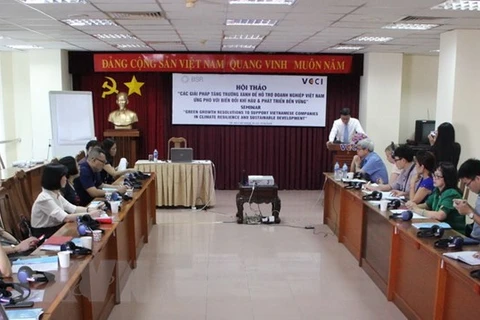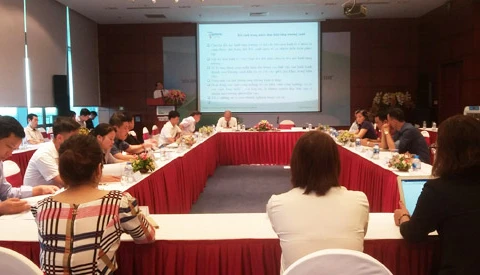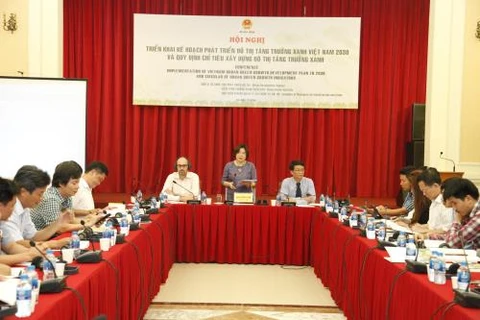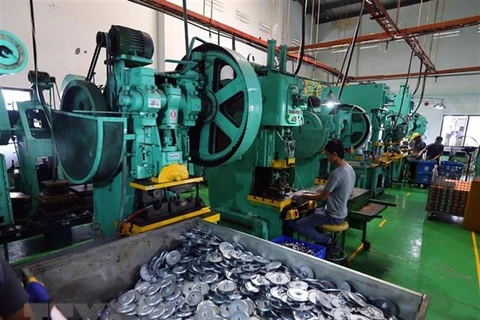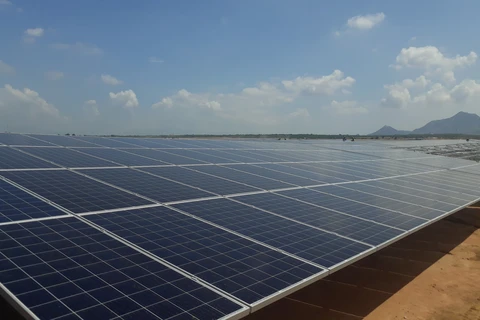Hanoi (VNS/VNA) - The banking sector plays a key role in “green” investment, including directing credit flow into environmentally-friendly sectors and restricting flow into projects which might have negative impacts on the environment.
This was highlighted at a conference about developing green banking in Vietnam organised by the Banking Strategy Institute in Hanoi on November 8.
The conference aimed to enhance awareness and corporate responsibility in the banking sector of environmental protection, responses to climate change and gradually making banking activities more ‘green’.
Focus would be placed on directing credit flow into eco-friendly projects, boosting green production and services as well as clean and renewable energy so as to contribute to promoting green and sustainable growth.
Deputy Director of the Banking Strategy Institute Pham Xuan Hoe said that as Vietnam faced a number of environmental problems, including climate change, natural disasters, drought, floods and pollution, the goal over the next two decades would not only be achieving rapid growth but also sustainable economic development.
Hoe said to successfully implement the national green growth strategy in 2011-20, the banking sector played a very important role in promoting the transition towards sustainable growth though credit policies which target environmentally-friendly projects.
The banking sector was the bridge connecting depositors and borrowers and also participated in project risk management, including environmental risks. At the same time, banking activity can also promote environmental protection through the application of e-banking and non-paper policies.
“The banking sector plays a significant role in green investment and directing credit to eco-friendly sectors,” Hoe said, adding that credit policies which prioritised environmentally-friendly projects would encourage borrowers to implement green projects rather than those that damage the environment.
Green credit policies were also key to saving energy, reducing emissions and directing the economy towards green growth, Hoe said.
The Governor of the State Bank of Vietnam issued Decision No 1640/QD-NHNN approving the scheme on green bank development in Vietnam on August 7.
The scheme aims to gradually increase the lending to green industries and sectors while accelerating the application of new technologies and environmentally-friendly practices among bank clients, promoting e-transactions, new services and modern payment instruments.
Under the scheme, by 2025, all banks in the country would develop their internal regulations on environmental and social risk management in their lending activities. In addition, all banks would conduct the assessment of social and environmental risks in their lending activities and apply environmental standards for all projects receiving loans from the banks.
The environmental risk assessment will be integrated as part of the banks’ credit risk assessment.
As part of the scheme, 10 to 12 banks would establish specialised units for social and environmental risk management and at least 60 per cent of the banks would have access to green capital resources and provide green credit.-VNS/VNA
This was highlighted at a conference about developing green banking in Vietnam organised by the Banking Strategy Institute in Hanoi on November 8.
The conference aimed to enhance awareness and corporate responsibility in the banking sector of environmental protection, responses to climate change and gradually making banking activities more ‘green’.
Focus would be placed on directing credit flow into eco-friendly projects, boosting green production and services as well as clean and renewable energy so as to contribute to promoting green and sustainable growth.
Deputy Director of the Banking Strategy Institute Pham Xuan Hoe said that as Vietnam faced a number of environmental problems, including climate change, natural disasters, drought, floods and pollution, the goal over the next two decades would not only be achieving rapid growth but also sustainable economic development.
Hoe said to successfully implement the national green growth strategy in 2011-20, the banking sector played a very important role in promoting the transition towards sustainable growth though credit policies which target environmentally-friendly projects.
The banking sector was the bridge connecting depositors and borrowers and also participated in project risk management, including environmental risks. At the same time, banking activity can also promote environmental protection through the application of e-banking and non-paper policies.
“The banking sector plays a significant role in green investment and directing credit to eco-friendly sectors,” Hoe said, adding that credit policies which prioritised environmentally-friendly projects would encourage borrowers to implement green projects rather than those that damage the environment.
Green credit policies were also key to saving energy, reducing emissions and directing the economy towards green growth, Hoe said.
The Governor of the State Bank of Vietnam issued Decision No 1640/QD-NHNN approving the scheme on green bank development in Vietnam on August 7.
The scheme aims to gradually increase the lending to green industries and sectors while accelerating the application of new technologies and environmentally-friendly practices among bank clients, promoting e-transactions, new services and modern payment instruments.
Under the scheme, by 2025, all banks in the country would develop their internal regulations on environmental and social risk management in their lending activities. In addition, all banks would conduct the assessment of social and environmental risks in their lending activities and apply environmental standards for all projects receiving loans from the banks.
The environmental risk assessment will be integrated as part of the banks’ credit risk assessment.
As part of the scheme, 10 to 12 banks would establish specialised units for social and environmental risk management and at least 60 per cent of the banks would have access to green capital resources and provide green credit.-VNS/VNA
VNA

